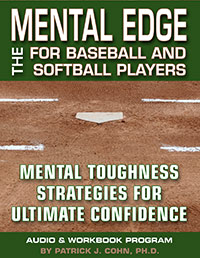
Why Confidence From Others Doesn’t Help
How can you find the confidence in your abilities when it seems no one else believes in you?
Confidence can seem elusive when you know you have the talent, ability, or technical skills, yet your coaches, teammates, or parents don’t see or acknowledge your potential.
In our Softball and Baseball Mental Toughness Survey, one player is struggling with this very issue:
“How do I deal with the negative feelings about my ability when no one seems to believe in me? I just don’t have the confidence even though I know I’m a good player.”
Your experience is common among athletes. You work hard and want validation from others. When you have a great practice and your coach fails to recognize your play, it hurts.
You feel if your coach believes in you that you will be able to raise your level of play. When you have one of your best games, you want your parents to celebrate your performance.
You want to hear, “That was a great game. I knew you could do it. You have so much potential. I believe that this is just the beginning.”
Though you may want that validation, and it may give you a temporary boost in your confidence, it will soon fade.
When you crave confidence from others, you will need an increasing level of acknowledgement just to keep your confidence tank slightly filled. And it’s not consistent.
Anyway, when you are talking about confidence, you really are referring to SELF-confidence.
Not coaching confidence… While your coach’s confidence in you may feel good, if you don’t believe in yourself and your abilities, your coach’s opinion will not help you perform better on the field. Parent-confidence may stir positive emotions, but it means nothing if you do not have confidence in your skills.
To have stable confidence, you need to feed on internal sources of confidence.
A great example of stable confidence is Mississippi State University second baseman Justin Foscue… Foscue was drafted 14th overall in the 2020 MLB draft by the Texas Rangers.
Foscue detailed how he was able to develop such a high level of stable confidence.
FOSCUE: “I would say that throughout my whole life, I’ve never been the top rank kind of player. You know, in high school, I never was highly touted or heavily recruited. But I always felt like I belonged in the SEC, the ACC, that kind of level of play. So I had a chip on my shoulder to prove people wrong.”
“I believed in myself, and I just went to work and I put my put my head down and I didn’t listen to the outside noise with the rankings and such. So just having that ability to not worry about the noise and distractions and always believing in myself, I think that’s how I got myself to this point.”
You don’t need to prove others wrong but if that bit of motivation helps, then use it. Most important is that you prove yourself right. Foster your own confidence–do not rely on others.
When you feed your confidence daily, you will develop stable confidence and will not need to rely on outside sources for your confidence.
Developing SELF-Confidence
Remember, focusing on your talents is the best method for developing stable confidence.
Identify three sources of confidence: past successes, taking extra batting practice, spending 10 minutes strengthening your mental game, etc.
Think about what you have–strengths and abilities–not what teammates have. Always remember, you are responsible for your confidence, not others.
Related Sports Psychology Articles
- How to Build Steadfast Self-Confidence as a Ball Player
- Self-Confidence and Taking Risks in Baseball
- Do You Have Fragile Self-Confidence?
*Subscribe to The Sports Psychology Podcast on iTunes
*Subscribe to The Sports Psychology Podcast on Spotify
Get The Mental Edge for Baseball and Softball
If you have trouble taking your practice game to competition and under perform in games, your mental game might be the culprit! Baseball and softball players contact me everyday wanting to know why they become scared, anxious, afraid to make mistakes, and lack trust in their skills during games…
You might have a ton of physical talent and perform great in practice, but if you can’t get the job done when it counts, something is missing and the problem is an inferior mental game–not talent or motivation.
We’ve spent the last six months developing a program to teach you how to improve your mental game in 8 easy-to-apply lessons–the same TOP lessons that I teach to baseball and softball players everyday in my one-on-one mental coaching program!

